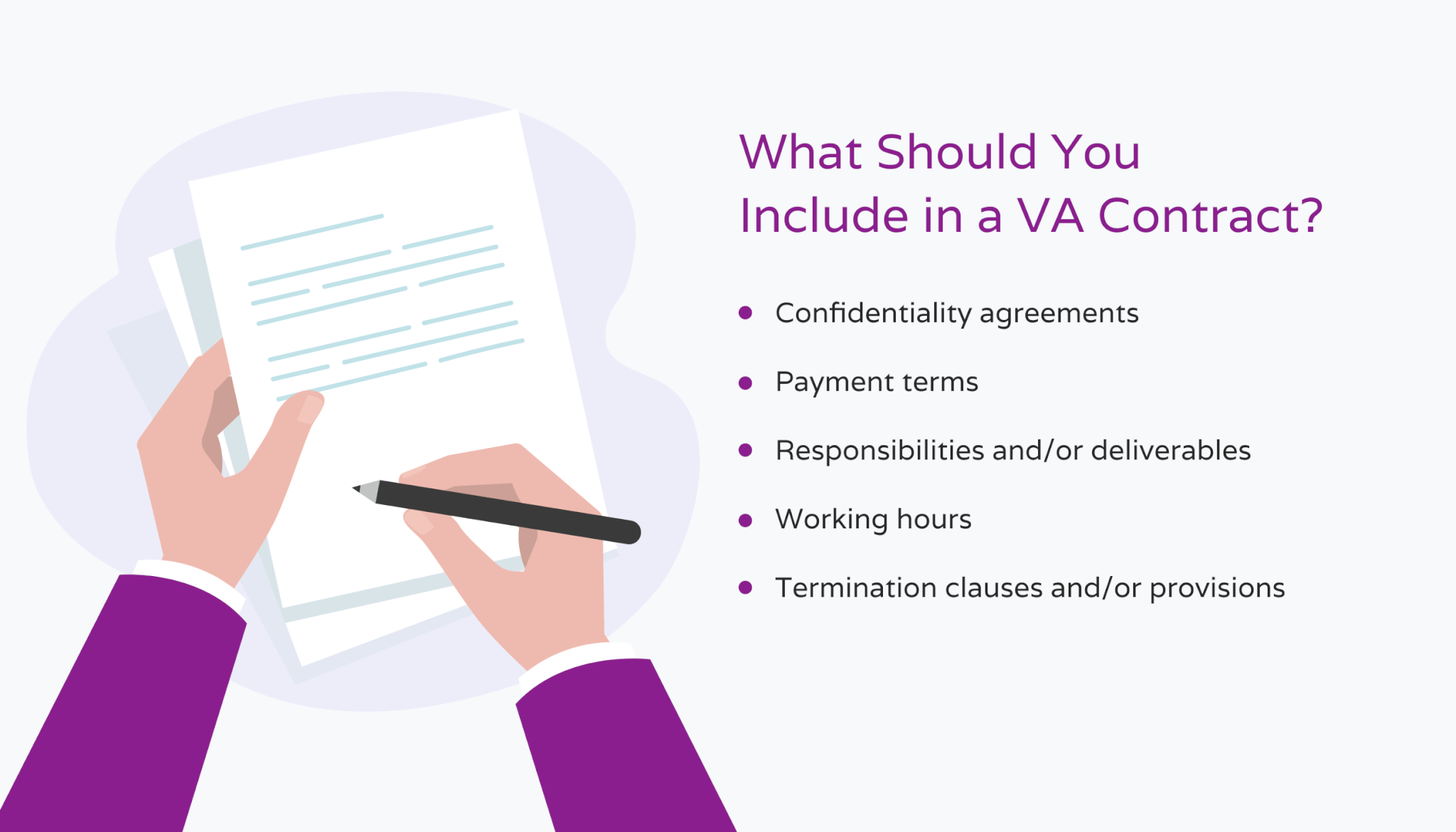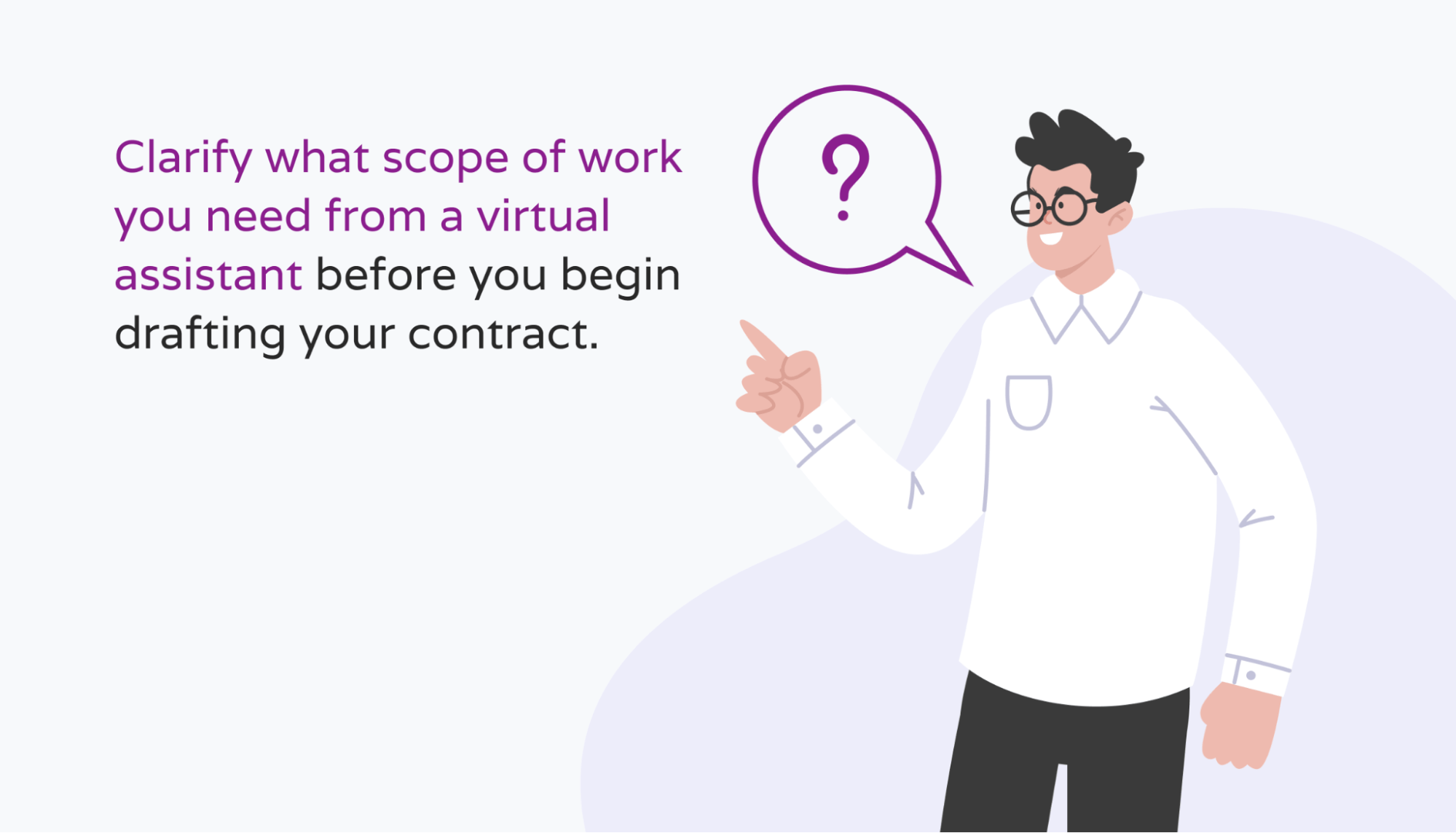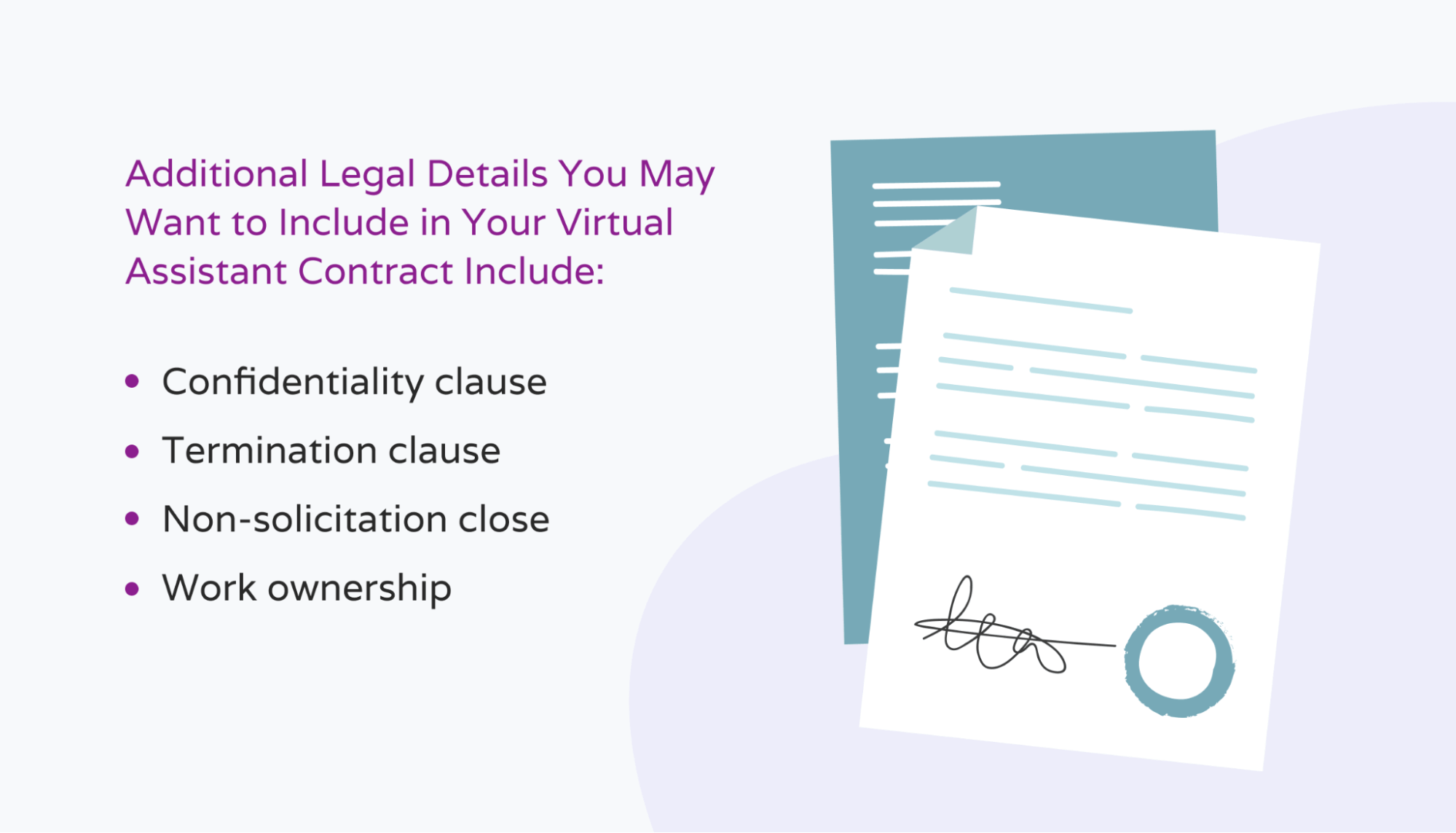Have you decided to add a virtual assistant to your healthcare practice?
Virtual assistants can completely transform your practice and save you both time and money. However, you must perform due diligence before bringing one onto your team. In most cases, you’ll need to write a contract and have your virtual assistant sign it to ensure that both of you are on the same page.
Without a contract, you’ll have no recourse if your assistant misses deadlines and responsibilities.
Keep reading to learn more about virtual assistant contracts and everything you need to include when you create your own.
What are the responsibilities of a virtual assistant?
Virtual assistants can handle a variety of responsibilities in your practice. You can delegate most clerical and administrative tasks that would usually fall on your (or your team’s) plate to them.
For example, they can be responsible for medical documentation and maintaining accurate patient records. If you don’t have electronic records, they can help you execute an EMR implementation plan and digitize your records.
Here are just a handful of other virtual assistant services you can outsource:
- Insurance verification and preauthorization
- Managing a virtual front desk for your medical office
- Answering phones, making appointments, and handling appointment reminders
- Light bookkeeping tasks
- Virtual medical billing
- Live charting and medical transcription
- Helping patients fill out forms and other paperwork
- Answering patient queries
- Arranging patient referrals
- Managing your calendar

Do you wish you had a virtual assistant on your team, but don’t want to go through the entire recruitment process? With Hello Rache, you can get a qualified Healthcare Virtual Assistant in a matter of days. Book a call with our team to kickstart the process.
Do virtual assistants count as employees?
It’s important to know how to handle virtual assistants before you draft a contract for them.
If you hire a virtual assistant in the US as a remote, full-time employee, this person will count as an employee – even though they work remotely. This means you’ll have the same responsibilities toward them as you would for other employees in your practice.
But virtual assistants don’t have to be employees. They can be independent contractors or even freelancers. Hiring someone as an independent contractor makes it easier for clinics that require flexible arrangements.
Plus, employees are expensive to hire. Salary alone accounts for 70.5% of employee compensation on average in the private industry.
The remaining 30% is made up of:
- Retirement savings
- Insurance
- Legally required benefits
- Paid leave
- Supplemental pay, such as overtime
- Other perks and benefits
While not all of the above expenses are legal obligations for employers, attracting and retaining qualified staff members is easier when you have a competitive benefits package.
Can virtual assistants be independent contractors?
Many virtual assistants work as independent contractors instead of employees. In those cases, you can contact a freelancer and speak to them one-on-one without an intermediary.
Freelancers and independent contractors operate as free agents, which means you’ll supervise their work. Although they’re not your employees, keeping a close eye on their performance is important to ensure compliance, safety, and optimal performance.
But it can be time-consuming to supervise an independent contractor or freelancer. And since the goal of hiring a virtual assistant is to save time, it can also be counterproductive.
Another option is to hire an agency to manage virtual assistants for you. Virtual assistant companies and agencies vet, hire, train, and supervise virtual assistants as their own employees. When you pay these companies, they assign their employees to help you with your tasks.
The drawback of virtual assistant companies is that you may not always work with the same person every day. Medical outsourcing becomes troublesome, as you need to constantly train new people to understand how your practice operates. (Hint: with Hello Rache, you’ll work with the same person every day!)

In both cases, your expense will be treated as if you’re hiring a contractor, not an employee. Contractors only require compensation for the work they do for you. You don’t need to pay them for insurance, paid leave, or other employee benefits.
Do virtual assistants need contracts?
If virtual assistants don’t always have to be employees, do they require contracts before they can start to work with you?
The short answer is that yes, you should use a contract for virtual assistants in almost every situation. This applies whether you’re hiring them as an employee or a contractor.
Contracts clarify the scope of work and responsibilities for your VA. It sets clear expectations and helps them understand their role within your practice.
Writing a contract for a virtual assistant also puts every detail about the payment terms in writing, which protects both of you. Your virtual assistant can make sure their tasks line up with what they were hired to do, and you can avoid getting overcharged for work you didn’t previously approve of.
You and your VA can refer to the contract if there’s a misunderstanding. For example, if your virtual assistant forgets about one task and demands payment from your team, you can point them to the contract and remind them of the missing tasks.
Both parties can also be clear on what happens regarding:
- Payment schedules
- Overtime
- Time off
- Missed deadlines
- Lack of communication
- Description of services
- Intellectual property
- And more
Contracts remove any ambiguity between your practice and anyone you hire for help.
What should you include in a VA contract?
Now that you know you need a contract before you hire support for your team, here are five important elements you should include when writing a contract for a virtual assistant.

1. Confidentiality agreements
Confidentiality agreements are clauses in a service agreement or contract that include non-disclosure and other confidentiality details. They bind the involved parties to the non-disclosure of proprietary or confidential information.
These types of non-disclosure agreements are used to make sure any sensitive information a VA will come across remains confidential. For example, you may need to share passwords, financial information, and other knowledge with your remote assistant.
There are other types of confidential details you may also want to protect when drafting your VA contract. For example, it’s important to protect your internal processes, methods, and other trade secrets.
Please note that even without a confidentiality agreement, you and your virtual assistant will be subject to HIPAA regulations. These regulations exist by default in the US. However, not all countries are subject to these regulations, so you can add details about your patients’ confidentiality in your contract to make sure your assistant respects them.
2. Payment terms
Details about payments aren’t always obvious. That’s why it’s best to include payment terms in a contract or service agreement for a virtual assistant.
Payment terms don’t just include the rate you’ll pay your VA. They also include:
- How often you’ll pay
- When and how you’ll pay your virtual assistant
- How payment will be evaluated (per hour, per day, per deliverable, etc.)
- Performance bonuses (if applicable)
Your payment terms can also specify what happens if you don’t pay on time or if your virtual assistant doesn’t perform as the contract states.
3. Responsibilities and/or deliverables
Who’s responsible for what in your practice? What is your role as the company, and what is your virtual assistant’s role in your practice as a contractor?
Your contract should include all the details about the responsibilities, deliverables, assigned duties, and other tasks your virtual assistant will need to perform. You should also include details about communication, especially if your VA will have more than one point of contact within your practice.
4. Working hours
Be sure to include a clause about working hours in your virtual assistant contract.
The importance of working hours will depend on the tasks your virtual assistant handles. For instance, if they’re doing live charting and managing reception, they’ll need to work within your clinic’s hours at all times.

On the other hand, if they’re only doing medical transcription, they may not have to follow a strict schedule. That will depend on your preferences and needs.
But you still need to specify how many hours you’ll expect from your virtual assistant in a given time frame. If you don’t expect a certain number of hours, you should specify what deliverables you’ll expect. For example, you may need 20 pages of transcriptions per week instead of 10 hours per week.
5. Termination clauses and/or provisions
What is considered cause for termination? Be sure to add those details to your contract. For example, you can specify that failure to complete tasks at the desired quality level is a good cause for termination.
You should also consider how much notice you or the VA will need to provide upon the VA’s departure. If you don’t specify those provisions, your VA will be able to terminate the agreement and quit with zero notice.
How do I write a contract for a virtual assistant?
Follow these four steps to write a solid contract for a virtual assistant in your practice.
1. Clarify the scope of needs for your practice
Before you start your contract, understand which tasks you need help with in your practice.

If you already have a team, call a meeting to get everyone’s input on the scope of the practice’s needs. You may discover that a staff member has some valuable ideas on how to streamline your processes – or you may find that another staff member is feeling overwhelmed with some of their responsibilities.
What happens if the scope of work changes over time? You can review the contract with your VA and make changes you both agree to.
2. Establish your budget and/or your VA’s rates
Specify the hourly rate you’ll pay your remote assistant.
If you don’t pay hourly, specify the payment timeframe, whether that’s per day, per deliverable, or something else.
How much you’ll pay your VA will depend on who you decide to hire. Some virtual assistants set their rates, while others adapt to your budget. And others will offer you different rates depending on the types of responsibilities you need them to handle.
3. Determine office hours for your VA
If you want your virtual assistant to work during specific hours, write them down in your contract. Remember to state the hours according to your time zone. This is especially important if you and your VA don’t operate from the same time zone – you don’t want to get your wires crossed!
Specify if you’ll expect overtime from your VA. If your needs vary, you can also state that hours will fluctuate depending on the work that’s available.
4. Sort out the legal stuff
When the details of your agreement look good, you can add the legal details, such as:
- A confidentiality clause
- A termination clause
- Non-solicitation clauses
- Work ownership

You can have a lawyer look through those details to make sure everything looks good. That’s the only way to ensure that you’ve created a legally binding contract that suits your needs.
Keep in mind that a virtual assistant who works as an independent contractor may not agree to all the details of your contract. That’s why it’s important to communicate clearly with them before you agree to anything.
The easiest way to hire a virtual assistant for your practice (without a contract)
Virtual assistants can make a massive difference in how you operate your practice. But finding the right contractor and writing an airtight contract is time-consuming and risky.
The easiest way to get help in your practice without having to handle contracts and the associated risk of freelancers is to work with Hello Rache.
Not only does Hello Rache have some of the best virtual assistants trained in healthcare, but we also handle all the contracts and other legal details for you. Book a call with our team to discuss how a Healthcare Virtual Assistant can help your practice.






